Comprehensive Analysis: Nigerian Economy, Growth, and Issues
VerifiedAdded on 2019/12/03
|13
|3155
|201
Report
AI Summary
This report provides an in-depth analysis of the Nigerian economy, examining its growth trajectory, key economic indicators, and its position within the African continent. It delves into the various issues plaguing the Nigerian economy, including corruption, unemployment, poverty, and the impact of events like the Ebola outbreak and the Boko Haram insurgency. The report also discusses Nigeria's contribution to the African economy and identifies areas where the nation should prioritize its efforts over the next few years, such as education, poverty reduction, and healthcare. Furthermore, it explores the fiscal and monetary policies of Nigeria and their effectiveness in fostering economic development. The analysis covers the period up to 2015, providing insights into the country's economic performance and future prospects.
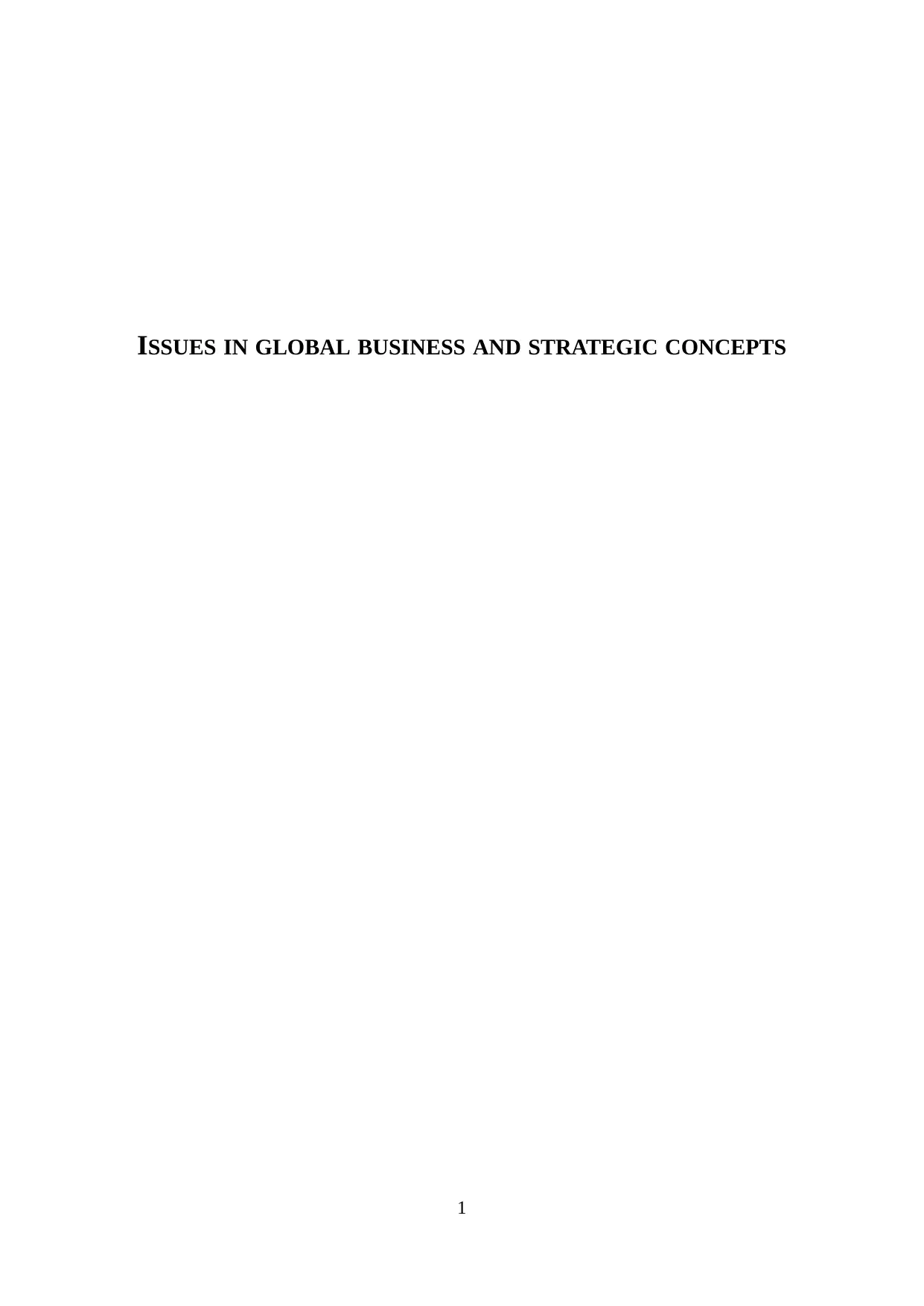
ISSUES IN GLOBAL BUSINESS AND STRATEGIC CONCEPTS
1
1
Paraphrase This Document
Need a fresh take? Get an instant paraphrase of this document with our AI Paraphraser
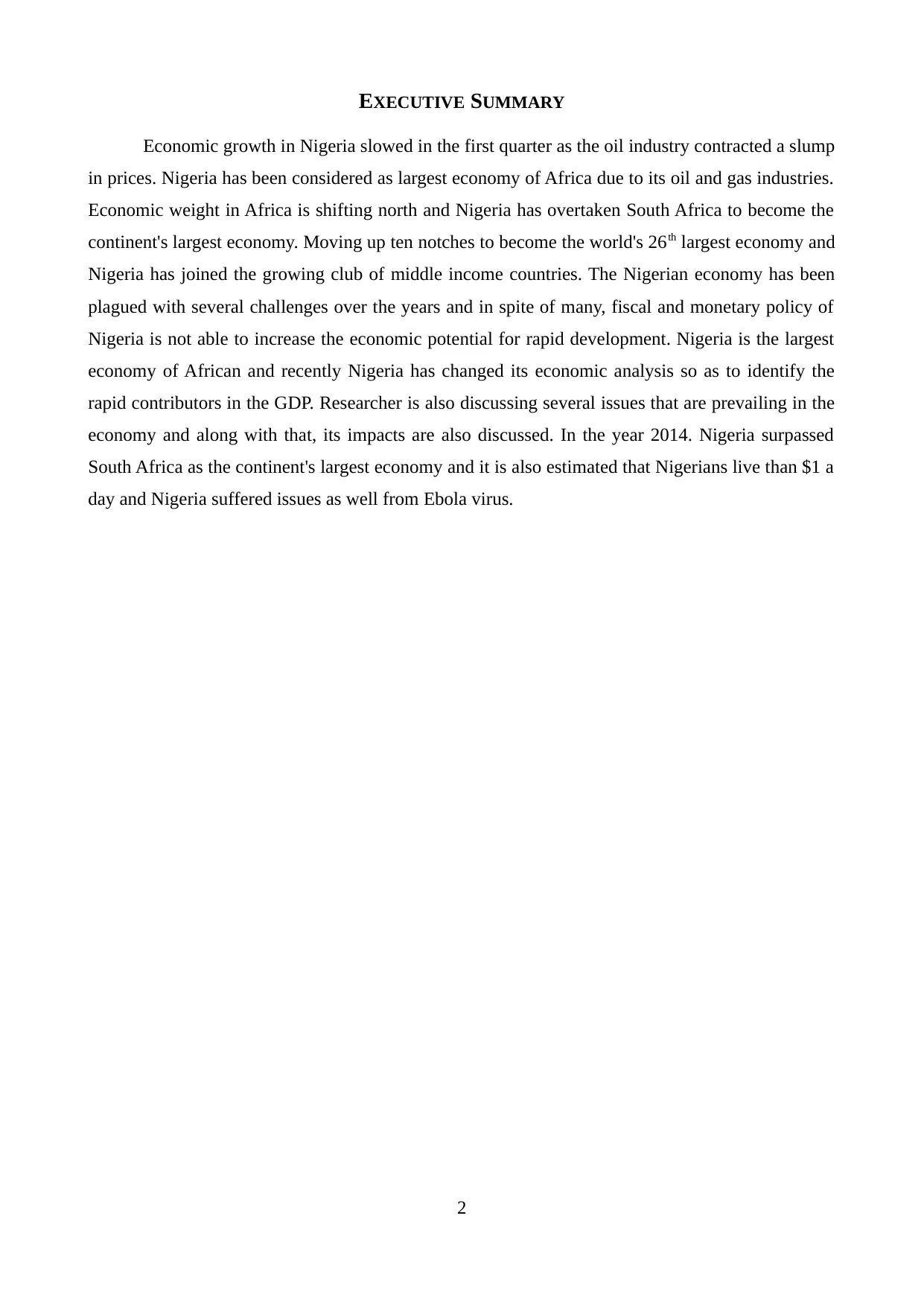
EXECUTIVE SUMMARY
Economic growth in Nigeria slowed in the first quarter as the oil industry contracted a slump
in prices. Nigeria has been considered as largest economy of Africa due to its oil and gas industries.
Economic weight in Africa is shifting north and Nigeria has overtaken South Africa to become the
continent's largest economy. Moving up ten notches to become the world's 26th largest economy and
Nigeria has joined the growing club of middle income countries. The Nigerian economy has been
plagued with several challenges over the years and in spite of many, fiscal and monetary policy of
Nigeria is not able to increase the economic potential for rapid development. Nigeria is the largest
economy of African and recently Nigeria has changed its economic analysis so as to identify the
rapid contributors in the GDP. Researcher is also discussing several issues that are prevailing in the
economy and along with that, its impacts are also discussed. In the year 2014. Nigeria surpassed
South Africa as the continent's largest economy and it is also estimated that Nigerians live than $1 a
day and Nigeria suffered issues as well from Ebola virus.
2
Economic growth in Nigeria slowed in the first quarter as the oil industry contracted a slump
in prices. Nigeria has been considered as largest economy of Africa due to its oil and gas industries.
Economic weight in Africa is shifting north and Nigeria has overtaken South Africa to become the
continent's largest economy. Moving up ten notches to become the world's 26th largest economy and
Nigeria has joined the growing club of middle income countries. The Nigerian economy has been
plagued with several challenges over the years and in spite of many, fiscal and monetary policy of
Nigeria is not able to increase the economic potential for rapid development. Nigeria is the largest
economy of African and recently Nigeria has changed its economic analysis so as to identify the
rapid contributors in the GDP. Researcher is also discussing several issues that are prevailing in the
economy and along with that, its impacts are also discussed. In the year 2014. Nigeria surpassed
South Africa as the continent's largest economy and it is also estimated that Nigerians live than $1 a
day and Nigeria suffered issues as well from Ebola virus.
2
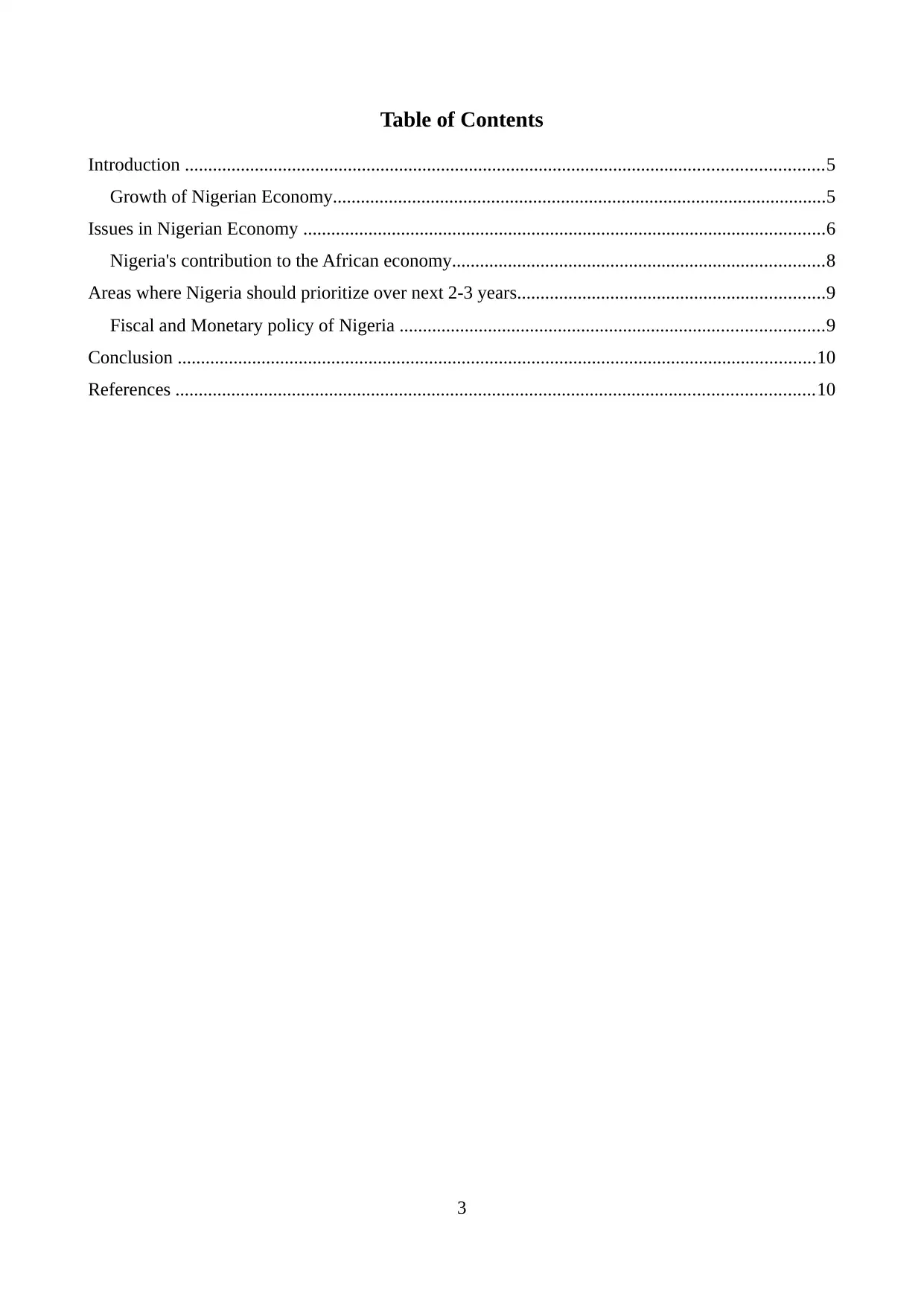
Table of Contents
Introduction .........................................................................................................................................5
Growth of Nigerian Economy..........................................................................................................5
Issues in Nigerian Economy ................................................................................................................6
Nigeria's contribution to the African economy................................................................................8
Areas where Nigeria should prioritize over next 2-3 years..................................................................9
Fiscal and Monetary policy of Nigeria ...........................................................................................9
Conclusion .........................................................................................................................................10
References .........................................................................................................................................10
3
Introduction .........................................................................................................................................5
Growth of Nigerian Economy..........................................................................................................5
Issues in Nigerian Economy ................................................................................................................6
Nigeria's contribution to the African economy................................................................................8
Areas where Nigeria should prioritize over next 2-3 years..................................................................9
Fiscal and Monetary policy of Nigeria ...........................................................................................9
Conclusion .........................................................................................................................................10
References .........................................................................................................................................10
3
⊘ This is a preview!⊘
Do you want full access?
Subscribe today to unlock all pages.

Trusted by 1+ million students worldwide
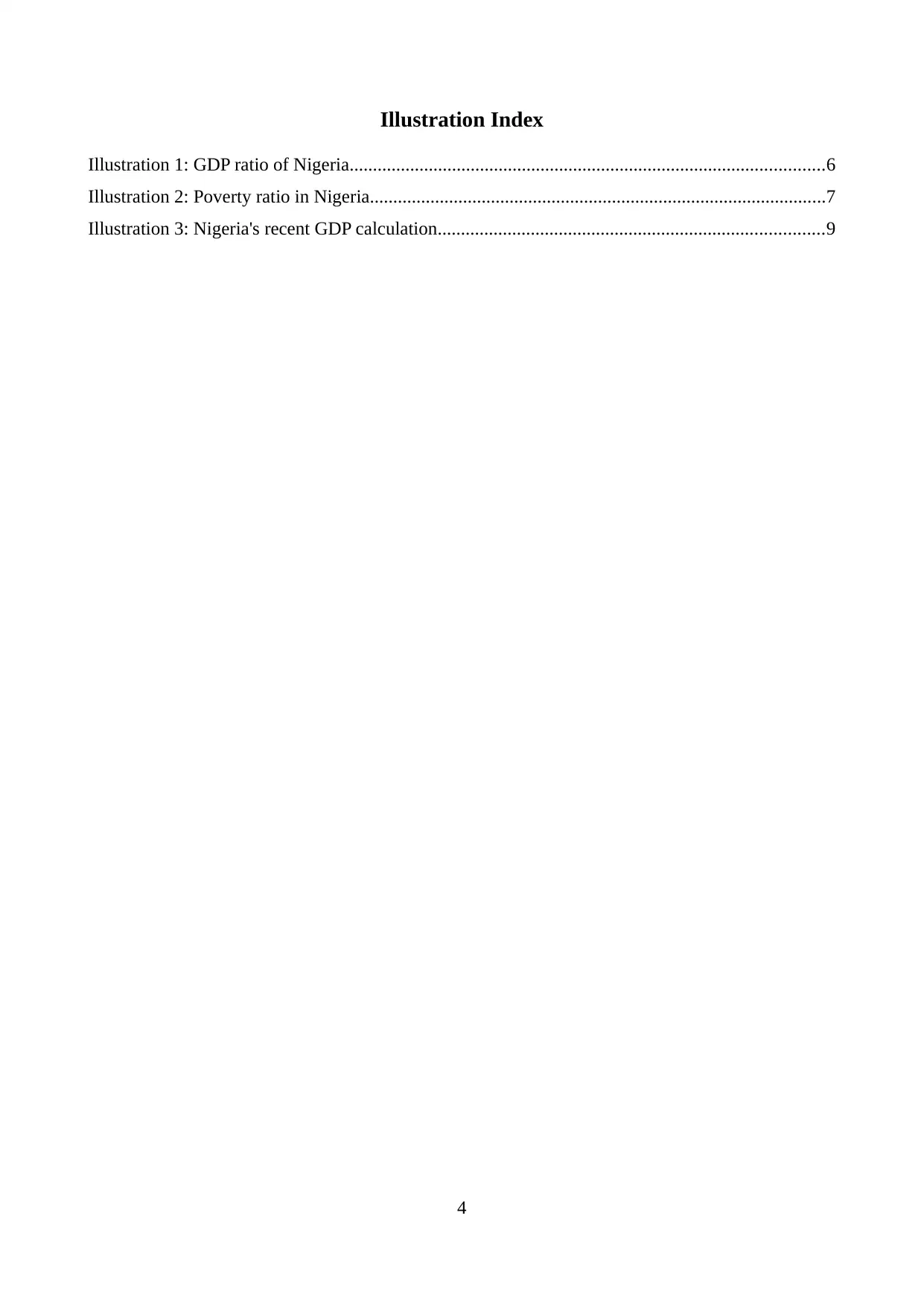
Illustration Index
Illustration 1: GDP ratio of Nigeria......................................................................................................6
Illustration 2: Poverty ratio in Nigeria..................................................................................................7
Illustration 3: Nigeria's recent GDP calculation...................................................................................9
4
Illustration 1: GDP ratio of Nigeria......................................................................................................6
Illustration 2: Poverty ratio in Nigeria..................................................................................................7
Illustration 3: Nigeria's recent GDP calculation...................................................................................9
4
Paraphrase This Document
Need a fresh take? Get an instant paraphrase of this document with our AI Paraphraser
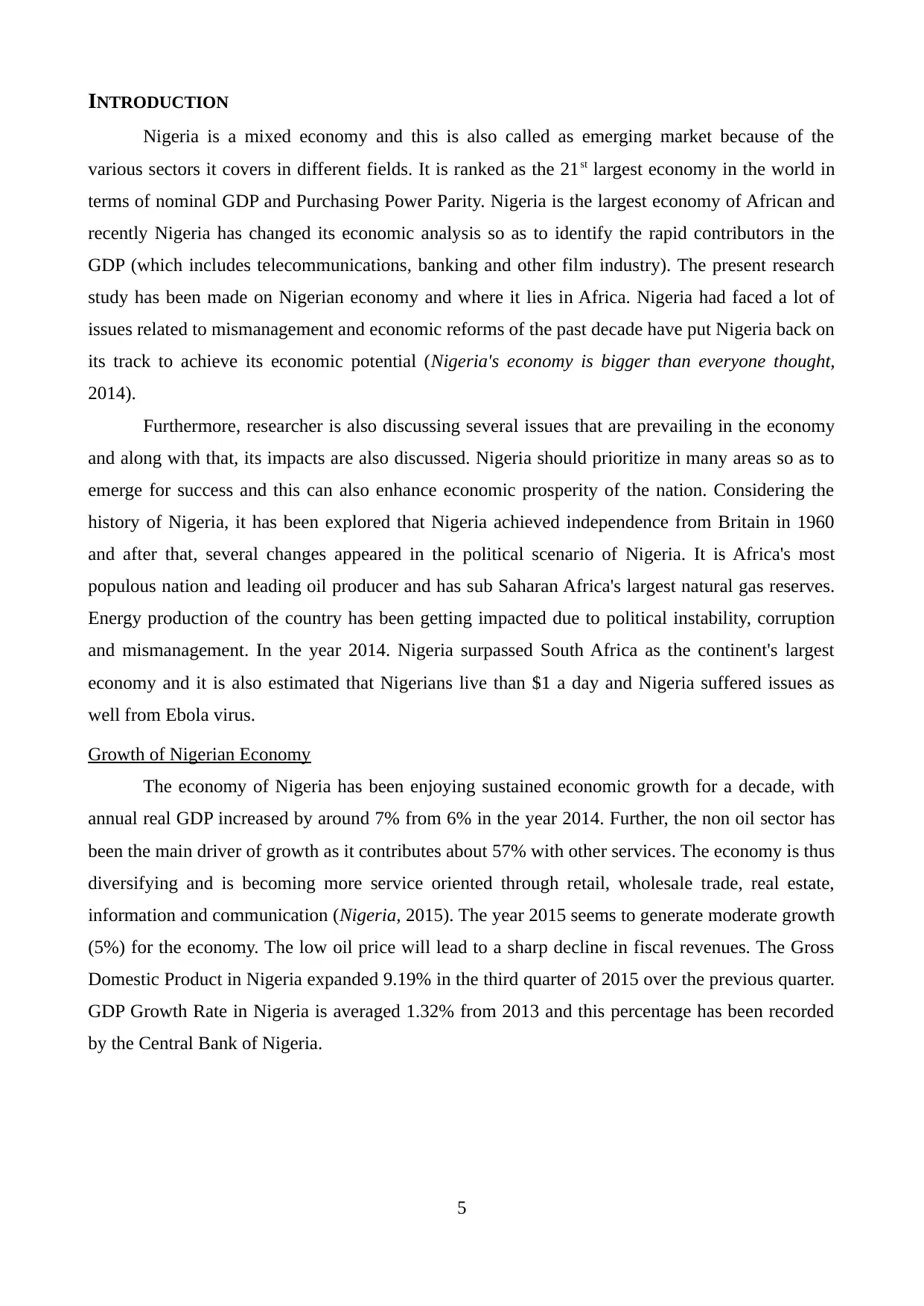
INTRODUCTION
Nigeria is a mixed economy and this is also called as emerging market because of the
various sectors it covers in different fields. It is ranked as the 21st largest economy in the world in
terms of nominal GDP and Purchasing Power Parity. Nigeria is the largest economy of African and
recently Nigeria has changed its economic analysis so as to identify the rapid contributors in the
GDP (which includes telecommunications, banking and other film industry). The present research
study has been made on Nigerian economy and where it lies in Africa. Nigeria had faced a lot of
issues related to mismanagement and economic reforms of the past decade have put Nigeria back on
its track to achieve its economic potential (Nigeria's economy is bigger than everyone thought,
2014).
Furthermore, researcher is also discussing several issues that are prevailing in the economy
and along with that, its impacts are also discussed. Nigeria should prioritize in many areas so as to
emerge for success and this can also enhance economic prosperity of the nation. Considering the
history of Nigeria, it has been explored that Nigeria achieved independence from Britain in 1960
and after that, several changes appeared in the political scenario of Nigeria. It is Africa's most
populous nation and leading oil producer and has sub Saharan Africa's largest natural gas reserves.
Energy production of the country has been getting impacted due to political instability, corruption
and mismanagement. In the year 2014. Nigeria surpassed South Africa as the continent's largest
economy and it is also estimated that Nigerians live than $1 a day and Nigeria suffered issues as
well from Ebola virus.
Growth of Nigerian Economy
The economy of Nigeria has been enjoying sustained economic growth for a decade, with
annual real GDP increased by around 7% from 6% in the year 2014. Further, the non oil sector has
been the main driver of growth as it contributes about 57% with other services. The economy is thus
diversifying and is becoming more service oriented through retail, wholesale trade, real estate,
information and communication (Nigeria, 2015). The year 2015 seems to generate moderate growth
(5%) for the economy. The low oil price will lead to a sharp decline in fiscal revenues. The Gross
Domestic Product in Nigeria expanded 9.19% in the third quarter of 2015 over the previous quarter.
GDP Growth Rate in Nigeria is averaged 1.32% from 2013 and this percentage has been recorded
by the Central Bank of Nigeria.
5
Nigeria is a mixed economy and this is also called as emerging market because of the
various sectors it covers in different fields. It is ranked as the 21st largest economy in the world in
terms of nominal GDP and Purchasing Power Parity. Nigeria is the largest economy of African and
recently Nigeria has changed its economic analysis so as to identify the rapid contributors in the
GDP (which includes telecommunications, banking and other film industry). The present research
study has been made on Nigerian economy and where it lies in Africa. Nigeria had faced a lot of
issues related to mismanagement and economic reforms of the past decade have put Nigeria back on
its track to achieve its economic potential (Nigeria's economy is bigger than everyone thought,
2014).
Furthermore, researcher is also discussing several issues that are prevailing in the economy
and along with that, its impacts are also discussed. Nigeria should prioritize in many areas so as to
emerge for success and this can also enhance economic prosperity of the nation. Considering the
history of Nigeria, it has been explored that Nigeria achieved independence from Britain in 1960
and after that, several changes appeared in the political scenario of Nigeria. It is Africa's most
populous nation and leading oil producer and has sub Saharan Africa's largest natural gas reserves.
Energy production of the country has been getting impacted due to political instability, corruption
and mismanagement. In the year 2014. Nigeria surpassed South Africa as the continent's largest
economy and it is also estimated that Nigerians live than $1 a day and Nigeria suffered issues as
well from Ebola virus.
Growth of Nigerian Economy
The economy of Nigeria has been enjoying sustained economic growth for a decade, with
annual real GDP increased by around 7% from 6% in the year 2014. Further, the non oil sector has
been the main driver of growth as it contributes about 57% with other services. The economy is thus
diversifying and is becoming more service oriented through retail, wholesale trade, real estate,
information and communication (Nigeria, 2015). The year 2015 seems to generate moderate growth
(5%) for the economy. The low oil price will lead to a sharp decline in fiscal revenues. The Gross
Domestic Product in Nigeria expanded 9.19% in the third quarter of 2015 over the previous quarter.
GDP Growth Rate in Nigeria is averaged 1.32% from 2013 and this percentage has been recorded
by the Central Bank of Nigeria.
5
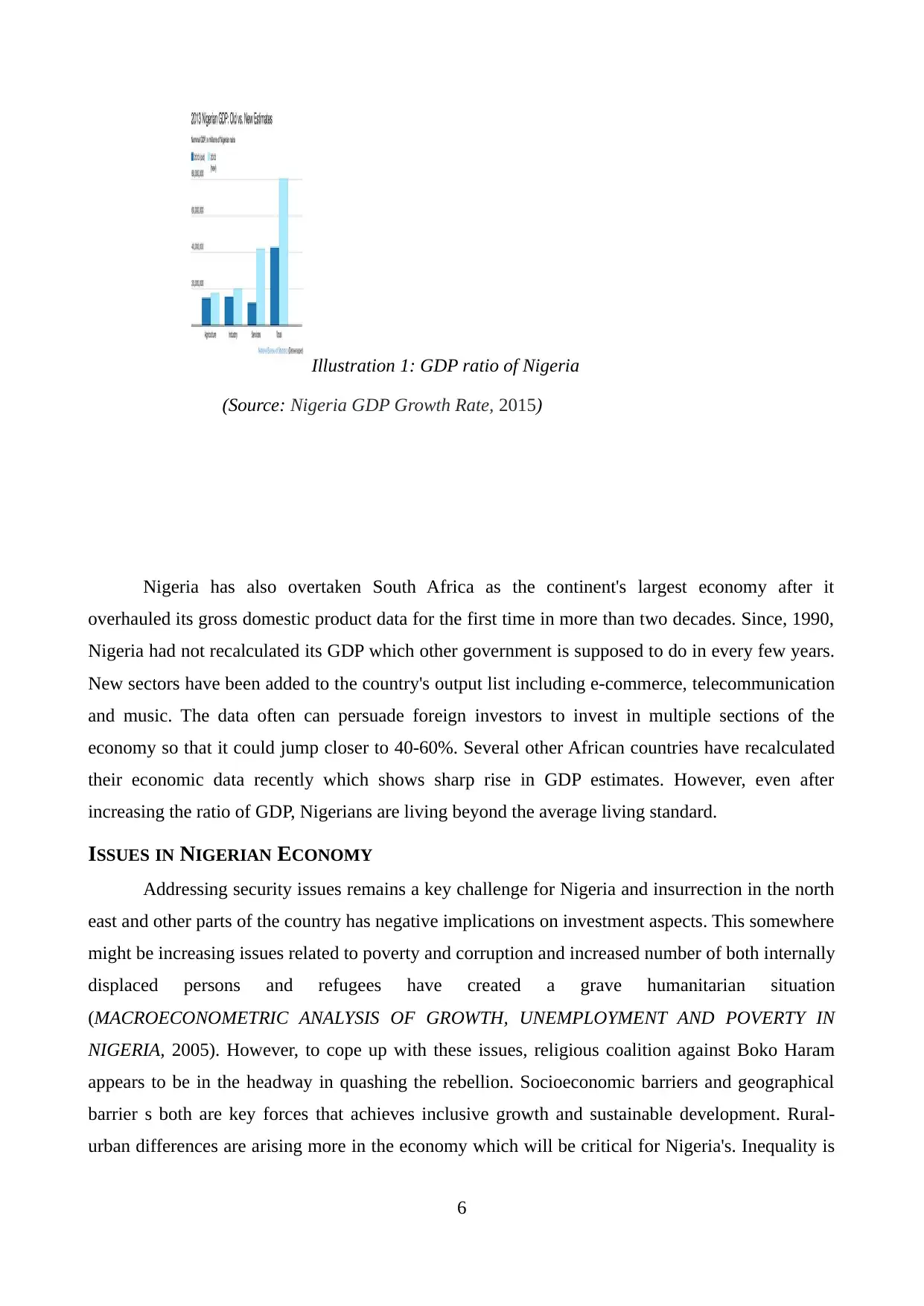
Illustration 1: GDP ratio of Nigeria
(Source: Nigeria GDP Growth Rate, 2015)
Nigeria has also overtaken South Africa as the continent's largest economy after it
overhauled its gross domestic product data for the first time in more than two decades. Since, 1990,
Nigeria had not recalculated its GDP which other government is supposed to do in every few years.
New sectors have been added to the country's output list including e-commerce, telecommunication
and music. The data often can persuade foreign investors to invest in multiple sections of the
economy so that it could jump closer to 40-60%. Several other African countries have recalculated
their economic data recently which shows sharp rise in GDP estimates. However, even after
increasing the ratio of GDP, Nigerians are living beyond the average living standard.
ISSUES IN NIGERIAN ECONOMY
Addressing security issues remains a key challenge for Nigeria and insurrection in the north
east and other parts of the country has negative implications on investment aspects. This somewhere
might be increasing issues related to poverty and corruption and increased number of both internally
displaced persons and refugees have created a grave humanitarian situation
(MACROECONOMETRIC ANALYSIS OF GROWTH, UNEMPLOYMENT AND POVERTY IN
NIGERIA, 2005). However, to cope up with these issues, religious coalition against Boko Haram
appears to be in the headway in quashing the rebellion. Socioeconomic barriers and geographical
barrier s both are key forces that achieves inclusive growth and sustainable development. Rural-
urban differences are arising more in the economy which will be critical for Nigeria's. Inequality is
6
(Source: Nigeria GDP Growth Rate, 2015)
Nigeria has also overtaken South Africa as the continent's largest economy after it
overhauled its gross domestic product data for the first time in more than two decades. Since, 1990,
Nigeria had not recalculated its GDP which other government is supposed to do in every few years.
New sectors have been added to the country's output list including e-commerce, telecommunication
and music. The data often can persuade foreign investors to invest in multiple sections of the
economy so that it could jump closer to 40-60%. Several other African countries have recalculated
their economic data recently which shows sharp rise in GDP estimates. However, even after
increasing the ratio of GDP, Nigerians are living beyond the average living standard.
ISSUES IN NIGERIAN ECONOMY
Addressing security issues remains a key challenge for Nigeria and insurrection in the north
east and other parts of the country has negative implications on investment aspects. This somewhere
might be increasing issues related to poverty and corruption and increased number of both internally
displaced persons and refugees have created a grave humanitarian situation
(MACROECONOMETRIC ANALYSIS OF GROWTH, UNEMPLOYMENT AND POVERTY IN
NIGERIA, 2005). However, to cope up with these issues, religious coalition against Boko Haram
appears to be in the headway in quashing the rebellion. Socioeconomic barriers and geographical
barrier s both are key forces that achieves inclusive growth and sustainable development. Rural-
urban differences are arising more in the economy which will be critical for Nigeria's. Inequality is
6
⊘ This is a preview!⊘
Do you want full access?
Subscribe today to unlock all pages.

Trusted by 1+ million students worldwide
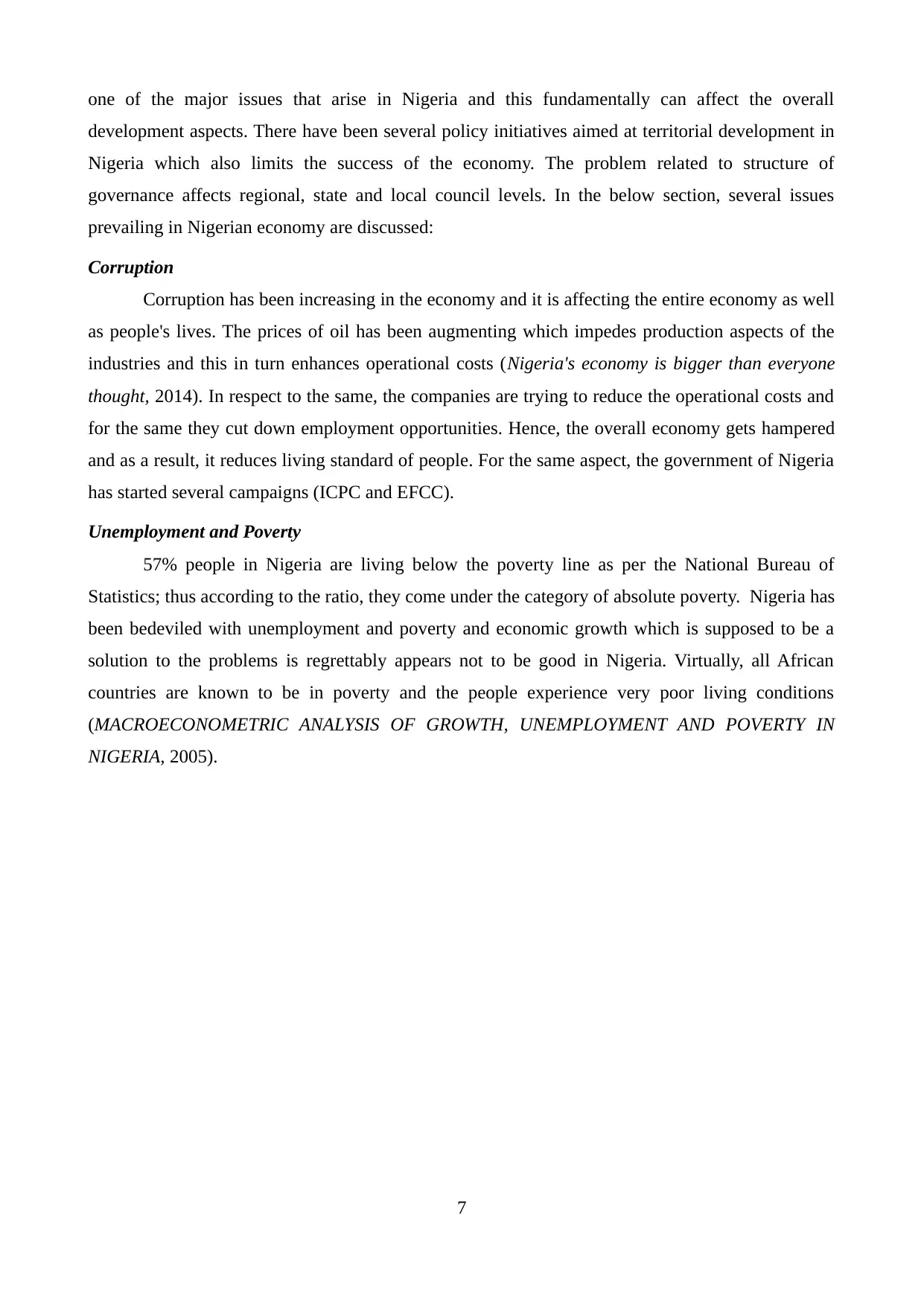
one of the major issues that arise in Nigeria and this fundamentally can affect the overall
development aspects. There have been several policy initiatives aimed at territorial development in
Nigeria which also limits the success of the economy. The problem related to structure of
governance affects regional, state and local council levels. In the below section, several issues
prevailing in Nigerian economy are discussed:
Corruption
Corruption has been increasing in the economy and it is affecting the entire economy as well
as people's lives. The prices of oil has been augmenting which impedes production aspects of the
industries and this in turn enhances operational costs (Nigeria's economy is bigger than everyone
thought, 2014). In respect to the same, the companies are trying to reduce the operational costs and
for the same they cut down employment opportunities. Hence, the overall economy gets hampered
and as a result, it reduces living standard of people. For the same aspect, the government of Nigeria
has started several campaigns (ICPC and EFCC).
Unemployment and Poverty
57% people in Nigeria are living below the poverty line as per the National Bureau of
Statistics; thus according to the ratio, they come under the category of absolute poverty. Nigeria has
been bedeviled with unemployment and poverty and economic growth which is supposed to be a
solution to the problems is regrettably appears not to be good in Nigeria. Virtually, all African
countries are known to be in poverty and the people experience very poor living conditions
(MACROECONOMETRIC ANALYSIS OF GROWTH, UNEMPLOYMENT AND POVERTY IN
NIGERIA, 2005).
7
development aspects. There have been several policy initiatives aimed at territorial development in
Nigeria which also limits the success of the economy. The problem related to structure of
governance affects regional, state and local council levels. In the below section, several issues
prevailing in Nigerian economy are discussed:
Corruption
Corruption has been increasing in the economy and it is affecting the entire economy as well
as people's lives. The prices of oil has been augmenting which impedes production aspects of the
industries and this in turn enhances operational costs (Nigeria's economy is bigger than everyone
thought, 2014). In respect to the same, the companies are trying to reduce the operational costs and
for the same they cut down employment opportunities. Hence, the overall economy gets hampered
and as a result, it reduces living standard of people. For the same aspect, the government of Nigeria
has started several campaigns (ICPC and EFCC).
Unemployment and Poverty
57% people in Nigeria are living below the poverty line as per the National Bureau of
Statistics; thus according to the ratio, they come under the category of absolute poverty. Nigeria has
been bedeviled with unemployment and poverty and economic growth which is supposed to be a
solution to the problems is regrettably appears not to be good in Nigeria. Virtually, all African
countries are known to be in poverty and the people experience very poor living conditions
(MACROECONOMETRIC ANALYSIS OF GROWTH, UNEMPLOYMENT AND POVERTY IN
NIGERIA, 2005).
7
Paraphrase This Document
Need a fresh take? Get an instant paraphrase of this document with our AI Paraphraser
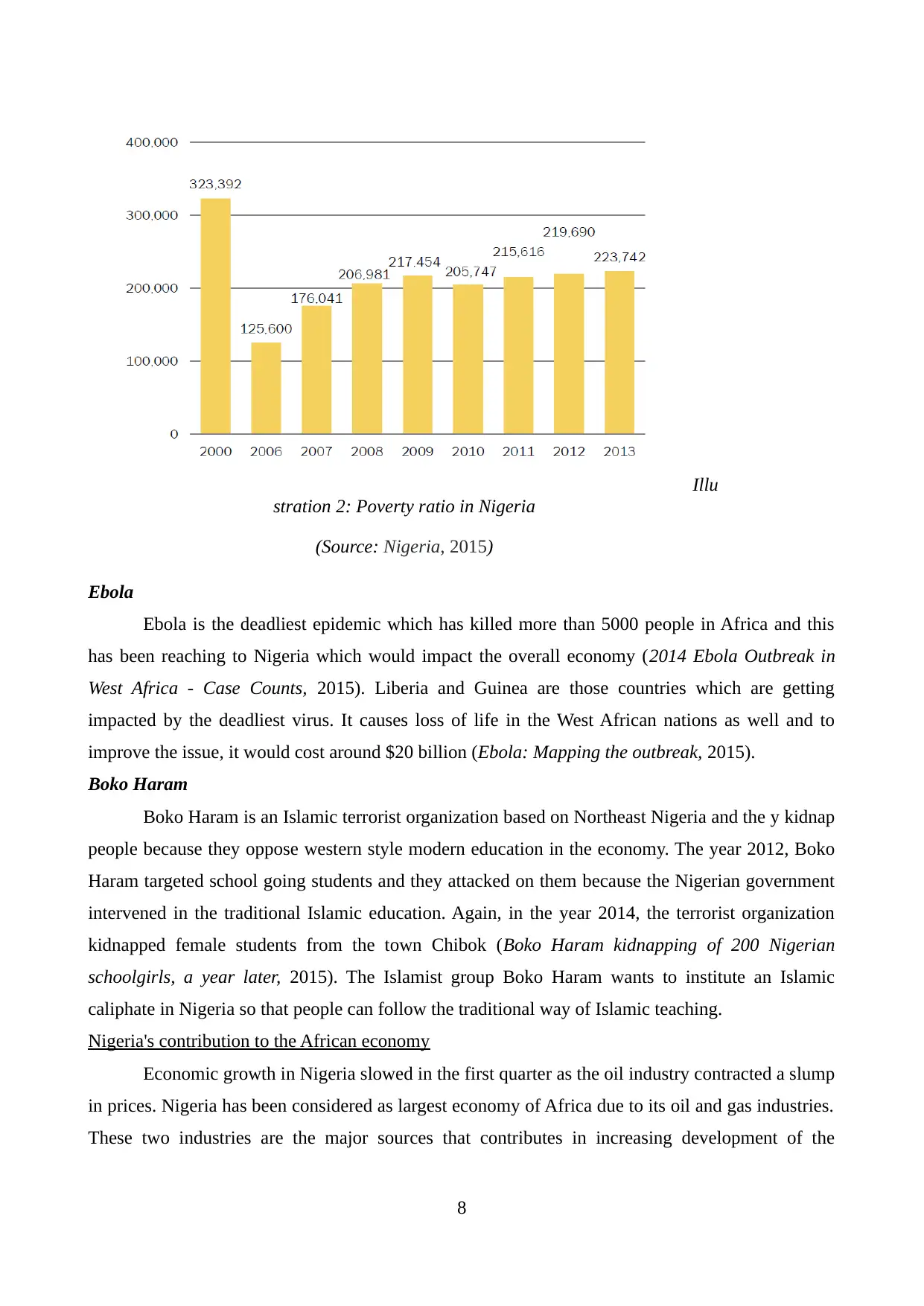
Illu
stration 2: Poverty ratio in Nigeria
(Source: Nigeria, 2015)
Ebola
Ebola is the deadliest epidemic which has killed more than 5000 people in Africa and this
has been reaching to Nigeria which would impact the overall economy (2014 Ebola Outbreak in
West Africa - Case Counts, 2015). Liberia and Guinea are those countries which are getting
impacted by the deadliest virus. It causes loss of life in the West African nations as well and to
improve the issue, it would cost around $20 billion (Ebola: Mapping the outbreak, 2015).
Boko Haram
Boko Haram is an Islamic terrorist organization based on Northeast Nigeria and the y kidnap
people because they oppose western style modern education in the economy. The year 2012, Boko
Haram targeted school going students and they attacked on them because the Nigerian government
intervened in the traditional Islamic education. Again, in the year 2014, the terrorist organization
kidnapped female students from the town Chibok (Boko Haram kidnapping of 200 Nigerian
schoolgirls, a year later, 2015). The Islamist group Boko Haram wants to institute an Islamic
caliphate in Nigeria so that people can follow the traditional way of Islamic teaching.
Nigeria's contribution to the African economy
Economic growth in Nigeria slowed in the first quarter as the oil industry contracted a slump
in prices. Nigeria has been considered as largest economy of Africa due to its oil and gas industries.
These two industries are the major sources that contributes in increasing development of the
8
stration 2: Poverty ratio in Nigeria
(Source: Nigeria, 2015)
Ebola
Ebola is the deadliest epidemic which has killed more than 5000 people in Africa and this
has been reaching to Nigeria which would impact the overall economy (2014 Ebola Outbreak in
West Africa - Case Counts, 2015). Liberia and Guinea are those countries which are getting
impacted by the deadliest virus. It causes loss of life in the West African nations as well and to
improve the issue, it would cost around $20 billion (Ebola: Mapping the outbreak, 2015).
Boko Haram
Boko Haram is an Islamic terrorist organization based on Northeast Nigeria and the y kidnap
people because they oppose western style modern education in the economy. The year 2012, Boko
Haram targeted school going students and they attacked on them because the Nigerian government
intervened in the traditional Islamic education. Again, in the year 2014, the terrorist organization
kidnapped female students from the town Chibok (Boko Haram kidnapping of 200 Nigerian
schoolgirls, a year later, 2015). The Islamist group Boko Haram wants to institute an Islamic
caliphate in Nigeria so that people can follow the traditional way of Islamic teaching.
Nigeria's contribution to the African economy
Economic growth in Nigeria slowed in the first quarter as the oil industry contracted a slump
in prices. Nigeria has been considered as largest economy of Africa due to its oil and gas industries.
These two industries are the major sources that contributes in increasing development of the
8
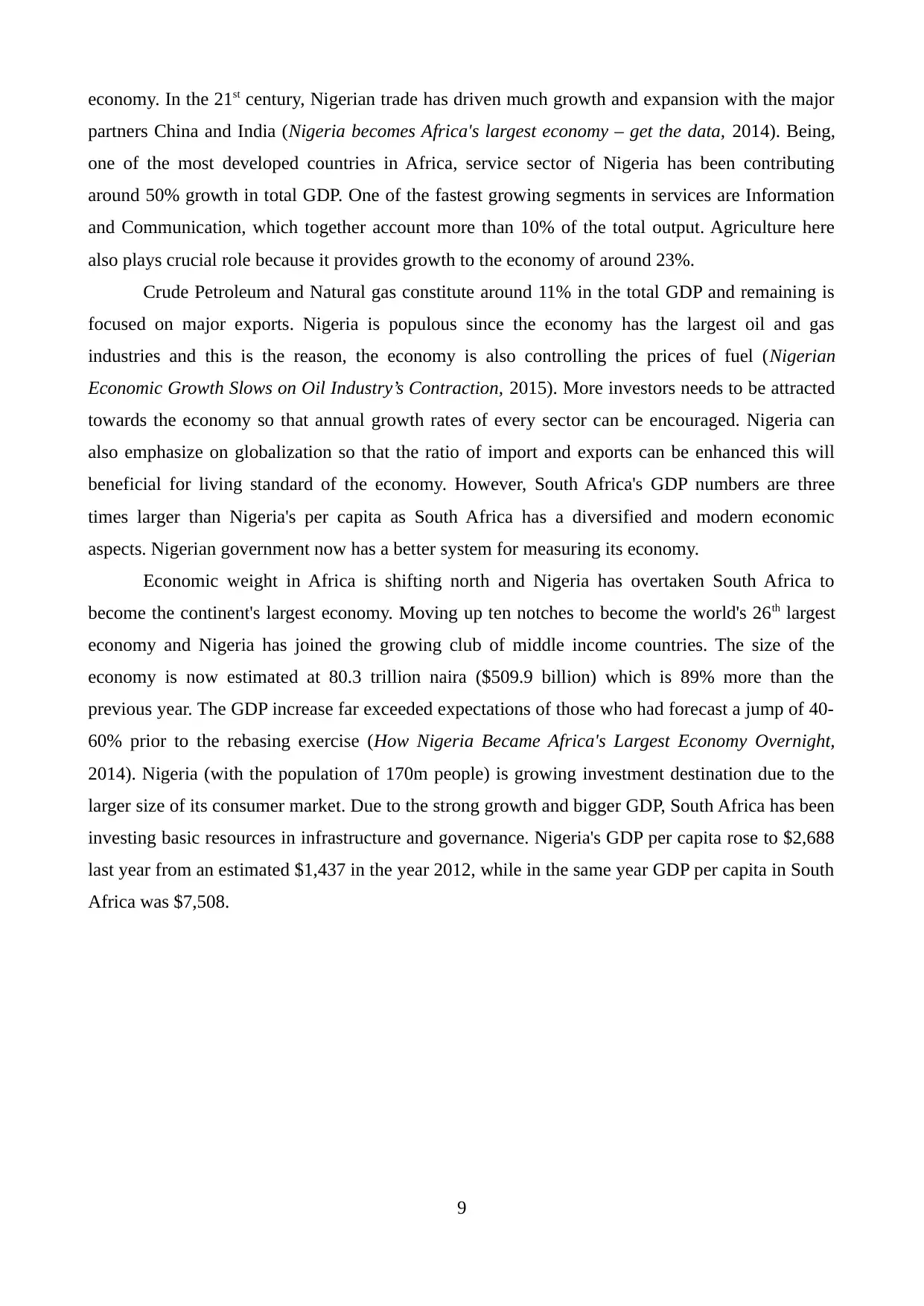
economy. In the 21st century, Nigerian trade has driven much growth and expansion with the major
partners China and India (Nigeria becomes Africa's largest economy – get the data, 2014). Being,
one of the most developed countries in Africa, service sector of Nigeria has been contributing
around 50% growth in total GDP. One of the fastest growing segments in services are Information
and Communication, which together account more than 10% of the total output. Agriculture here
also plays crucial role because it provides growth to the economy of around 23%.
Crude Petroleum and Natural gas constitute around 11% in the total GDP and remaining is
focused on major exports. Nigeria is populous since the economy has the largest oil and gas
industries and this is the reason, the economy is also controlling the prices of fuel (Nigerian
Economic Growth Slows on Oil Industry’s Contraction, 2015). More investors needs to be attracted
towards the economy so that annual growth rates of every sector can be encouraged. Nigeria can
also emphasize on globalization so that the ratio of import and exports can be enhanced this will
beneficial for living standard of the economy. However, South Africa's GDP numbers are three
times larger than Nigeria's per capita as South Africa has a diversified and modern economic
aspects. Nigerian government now has a better system for measuring its economy.
Economic weight in Africa is shifting north and Nigeria has overtaken South Africa to
become the continent's largest economy. Moving up ten notches to become the world's 26th largest
economy and Nigeria has joined the growing club of middle income countries. The size of the
economy is now estimated at 80.3 trillion naira ($509.9 billion) which is 89% more than the
previous year. The GDP increase far exceeded expectations of those who had forecast a jump of 40-
60% prior to the rebasing exercise (How Nigeria Became Africa's Largest Economy Overnight,
2014). Nigeria (with the population of 170m people) is growing investment destination due to the
larger size of its consumer market. Due to the strong growth and bigger GDP, South Africa has been
investing basic resources in infrastructure and governance. Nigeria's GDP per capita rose to $2,688
last year from an estimated $1,437 in the year 2012, while in the same year GDP per capita in South
Africa was $7,508.
9
partners China and India (Nigeria becomes Africa's largest economy – get the data, 2014). Being,
one of the most developed countries in Africa, service sector of Nigeria has been contributing
around 50% growth in total GDP. One of the fastest growing segments in services are Information
and Communication, which together account more than 10% of the total output. Agriculture here
also plays crucial role because it provides growth to the economy of around 23%.
Crude Petroleum and Natural gas constitute around 11% in the total GDP and remaining is
focused on major exports. Nigeria is populous since the economy has the largest oil and gas
industries and this is the reason, the economy is also controlling the prices of fuel (Nigerian
Economic Growth Slows on Oil Industry’s Contraction, 2015). More investors needs to be attracted
towards the economy so that annual growth rates of every sector can be encouraged. Nigeria can
also emphasize on globalization so that the ratio of import and exports can be enhanced this will
beneficial for living standard of the economy. However, South Africa's GDP numbers are three
times larger than Nigeria's per capita as South Africa has a diversified and modern economic
aspects. Nigerian government now has a better system for measuring its economy.
Economic weight in Africa is shifting north and Nigeria has overtaken South Africa to
become the continent's largest economy. Moving up ten notches to become the world's 26th largest
economy and Nigeria has joined the growing club of middle income countries. The size of the
economy is now estimated at 80.3 trillion naira ($509.9 billion) which is 89% more than the
previous year. The GDP increase far exceeded expectations of those who had forecast a jump of 40-
60% prior to the rebasing exercise (How Nigeria Became Africa's Largest Economy Overnight,
2014). Nigeria (with the population of 170m people) is growing investment destination due to the
larger size of its consumer market. Due to the strong growth and bigger GDP, South Africa has been
investing basic resources in infrastructure and governance. Nigeria's GDP per capita rose to $2,688
last year from an estimated $1,437 in the year 2012, while in the same year GDP per capita in South
Africa was $7,508.
9
⊘ This is a preview!⊘
Do you want full access?
Subscribe today to unlock all pages.

Trusted by 1+ million students worldwide
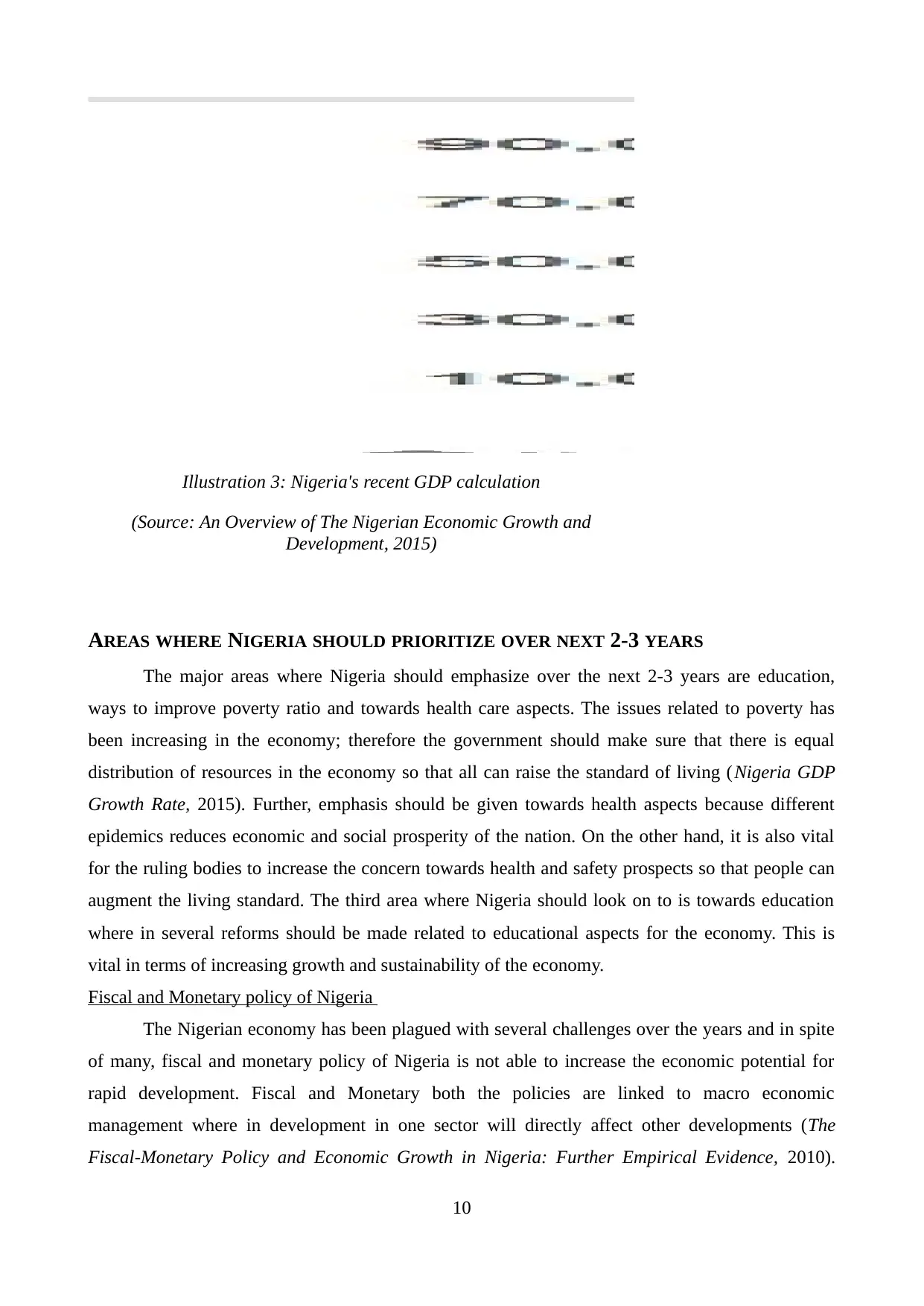
Illustration 3: Nigeria's recent GDP calculation
(Source: An Overview of The Nigerian Economic Growth and
Development, 2015)
AREAS WHERE NIGERIA SHOULD PRIORITIZE OVER NEXT 2-3 YEARS
The major areas where Nigeria should emphasize over the next 2-3 years are education,
ways to improve poverty ratio and towards health care aspects. The issues related to poverty has
been increasing in the economy; therefore the government should make sure that there is equal
distribution of resources in the economy so that all can raise the standard of living (Nigeria GDP
Growth Rate, 2015). Further, emphasis should be given towards health aspects because different
epidemics reduces economic and social prosperity of the nation. On the other hand, it is also vital
for the ruling bodies to increase the concern towards health and safety prospects so that people can
augment the living standard. The third area where Nigeria should look on to is towards education
where in several reforms should be made related to educational aspects for the economy. This is
vital in terms of increasing growth and sustainability of the economy.
Fiscal and Monetary policy of Nigeria
The Nigerian economy has been plagued with several challenges over the years and in spite
of many, fiscal and monetary policy of Nigeria is not able to increase the economic potential for
rapid development. Fiscal and Monetary both the policies are linked to macro economic
management where in development in one sector will directly affect other developments (The
Fiscal-Monetary Policy and Economic Growth in Nigeria: Further Empirical Evidence, 2010).
10
(Source: An Overview of The Nigerian Economic Growth and
Development, 2015)
AREAS WHERE NIGERIA SHOULD PRIORITIZE OVER NEXT 2-3 YEARS
The major areas where Nigeria should emphasize over the next 2-3 years are education,
ways to improve poverty ratio and towards health care aspects. The issues related to poverty has
been increasing in the economy; therefore the government should make sure that there is equal
distribution of resources in the economy so that all can raise the standard of living (Nigeria GDP
Growth Rate, 2015). Further, emphasis should be given towards health aspects because different
epidemics reduces economic and social prosperity of the nation. On the other hand, it is also vital
for the ruling bodies to increase the concern towards health and safety prospects so that people can
augment the living standard. The third area where Nigeria should look on to is towards education
where in several reforms should be made related to educational aspects for the economy. This is
vital in terms of increasing growth and sustainability of the economy.
Fiscal and Monetary policy of Nigeria
The Nigerian economy has been plagued with several challenges over the years and in spite
of many, fiscal and monetary policy of Nigeria is not able to increase the economic potential for
rapid development. Fiscal and Monetary both the policies are linked to macro economic
management where in development in one sector will directly affect other developments (The
Fiscal-Monetary Policy and Economic Growth in Nigeria: Further Empirical Evidence, 2010).
10
Paraphrase This Document
Need a fresh take? Get an instant paraphrase of this document with our AI Paraphraser
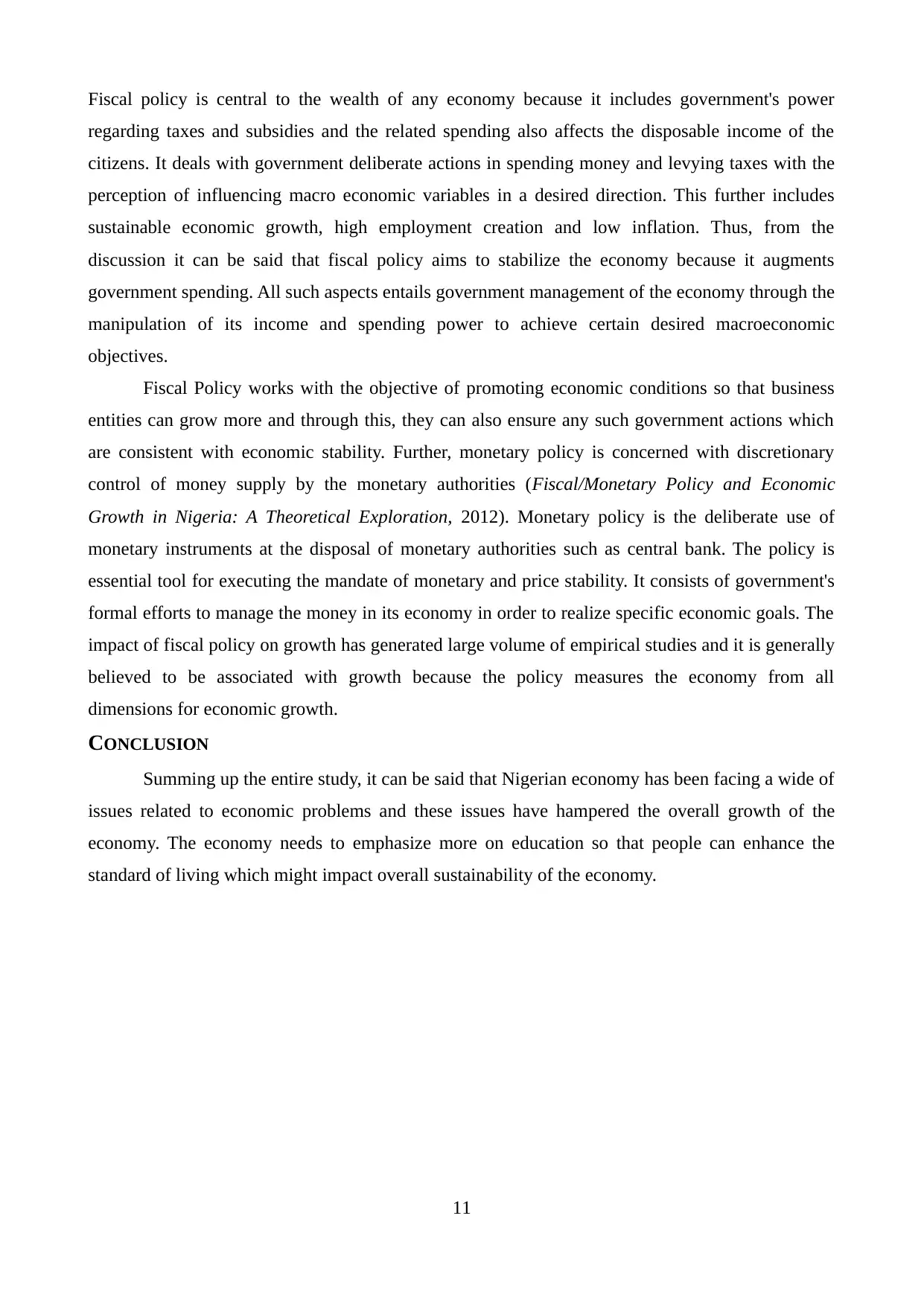
Fiscal policy is central to the wealth of any economy because it includes government's power
regarding taxes and subsidies and the related spending also affects the disposable income of the
citizens. It deals with government deliberate actions in spending money and levying taxes with the
perception of influencing macro economic variables in a desired direction. This further includes
sustainable economic growth, high employment creation and low inflation. Thus, from the
discussion it can be said that fiscal policy aims to stabilize the economy because it augments
government spending. All such aspects entails government management of the economy through the
manipulation of its income and spending power to achieve certain desired macroeconomic
objectives.
Fiscal Policy works with the objective of promoting economic conditions so that business
entities can grow more and through this, they can also ensure any such government actions which
are consistent with economic stability. Further, monetary policy is concerned with discretionary
control of money supply by the monetary authorities (Fiscal/Monetary Policy and Economic
Growth in Nigeria: A Theoretical Exploration, 2012). Monetary policy is the deliberate use of
monetary instruments at the disposal of monetary authorities such as central bank. The policy is
essential tool for executing the mandate of monetary and price stability. It consists of government's
formal efforts to manage the money in its economy in order to realize specific economic goals. The
impact of fiscal policy on growth has generated large volume of empirical studies and it is generally
believed to be associated with growth because the policy measures the economy from all
dimensions for economic growth.
CONCLUSION
Summing up the entire study, it can be said that Nigerian economy has been facing a wide of
issues related to economic problems and these issues have hampered the overall growth of the
economy. The economy needs to emphasize more on education so that people can enhance the
standard of living which might impact overall sustainability of the economy.
11
regarding taxes and subsidies and the related spending also affects the disposable income of the
citizens. It deals with government deliberate actions in spending money and levying taxes with the
perception of influencing macro economic variables in a desired direction. This further includes
sustainable economic growth, high employment creation and low inflation. Thus, from the
discussion it can be said that fiscal policy aims to stabilize the economy because it augments
government spending. All such aspects entails government management of the economy through the
manipulation of its income and spending power to achieve certain desired macroeconomic
objectives.
Fiscal Policy works with the objective of promoting economic conditions so that business
entities can grow more and through this, they can also ensure any such government actions which
are consistent with economic stability. Further, monetary policy is concerned with discretionary
control of money supply by the monetary authorities (Fiscal/Monetary Policy and Economic
Growth in Nigeria: A Theoretical Exploration, 2012). Monetary policy is the deliberate use of
monetary instruments at the disposal of monetary authorities such as central bank. The policy is
essential tool for executing the mandate of monetary and price stability. It consists of government's
formal efforts to manage the money in its economy in order to realize specific economic goals. The
impact of fiscal policy on growth has generated large volume of empirical studies and it is generally
believed to be associated with growth because the policy measures the economy from all
dimensions for economic growth.
CONCLUSION
Summing up the entire study, it can be said that Nigerian economy has been facing a wide of
issues related to economic problems and these issues have hampered the overall growth of the
economy. The economy needs to emphasize more on education so that people can enhance the
standard of living which might impact overall sustainability of the economy.
11
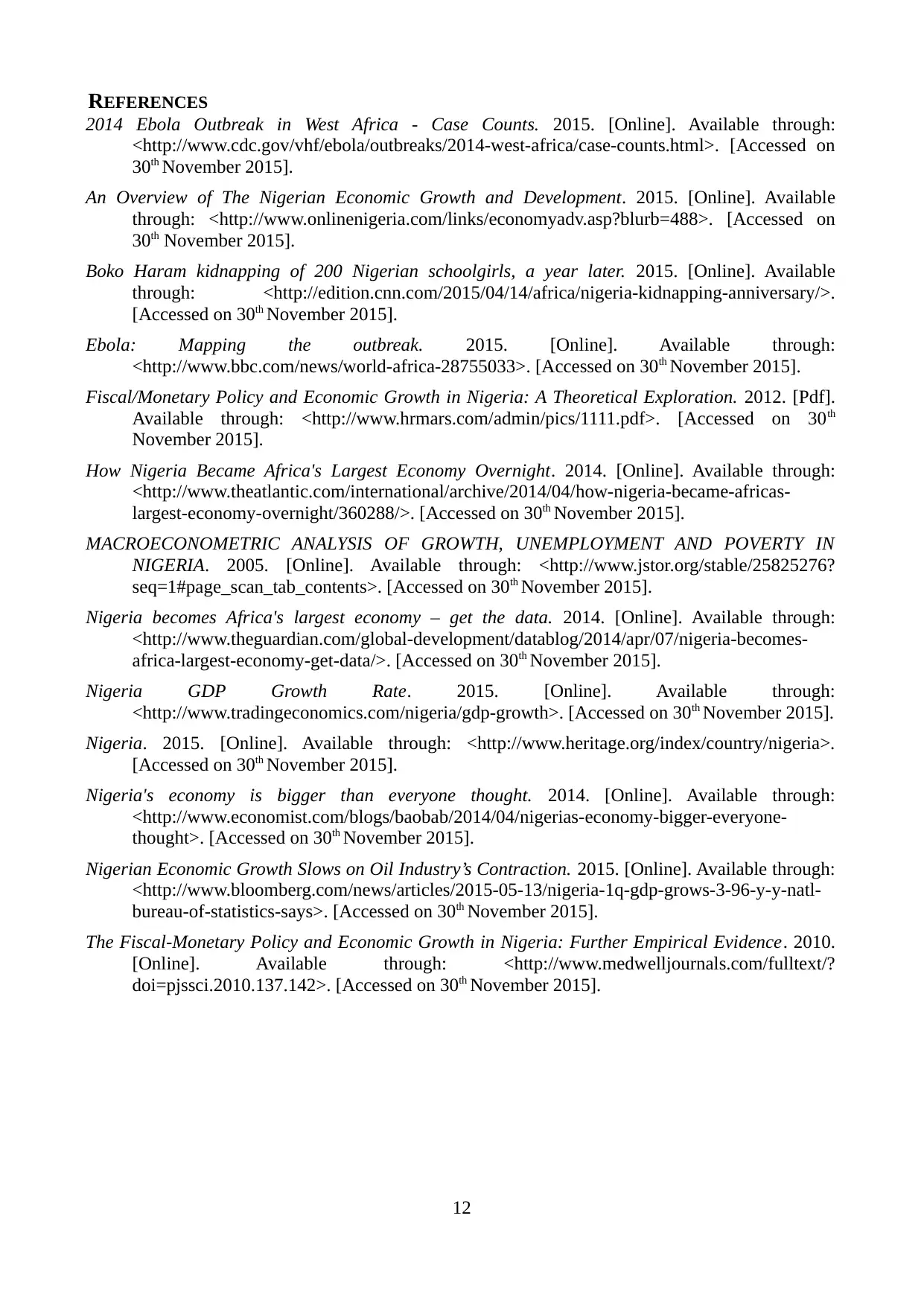
REFERENCES
2014 Ebola Outbreak in West Africa - Case Counts. 2015. [Online]. Available through:
<http://www.cdc.gov/vhf/ebola/outbreaks/2014-west-africa/case-counts.html>. [Accessed on
30th November 2015].
An Overview of The Nigerian Economic Growth and Development. 2015. [Online]. Available
through: <http://www.onlinenigeria.com/links/economyadv.asp?blurb=488>. [Accessed on
30th November 2015].
Boko Haram kidnapping of 200 Nigerian schoolgirls, a year later. 2015. [Online]. Available
through: <http://edition.cnn.com/2015/04/14/africa/nigeria-kidnapping-anniversary/>.
[Accessed on 30th November 2015].
Ebola: Mapping the outbreak. 2015. [Online]. Available through:
<http://www.bbc.com/news/world-africa-28755033>. [Accessed on 30th November 2015].
Fiscal/Monetary Policy and Economic Growth in Nigeria: A Theoretical Exploration. 2012. [Pdf].
Available through: <http://www.hrmars.com/admin/pics/1111.pdf>. [Accessed on 30th
November 2015].
How Nigeria Became Africa's Largest Economy Overnight. 2014. [Online]. Available through:
<http://www.theatlantic.com/international/archive/2014/04/how-nigeria-became-africas-
largest-economy-overnight/360288/>. [Accessed on 30th November 2015].
MACROECONOMETRIC ANALYSIS OF GROWTH, UNEMPLOYMENT AND POVERTY IN
NIGERIA. 2005. [Online]. Available through: <http://www.jstor.org/stable/25825276?
seq=1#page_scan_tab_contents>. [Accessed on 30th November 2015].
Nigeria becomes Africa's largest economy – get the data. 2014. [Online]. Available through:
<http://www.theguardian.com/global-development/datablog/2014/apr/07/nigeria-becomes-
africa-largest-economy-get-data/>. [Accessed on 30th November 2015].
Nigeria GDP Growth Rate. 2015. [Online]. Available through:
<http://www.tradingeconomics.com/nigeria/gdp-growth>. [Accessed on 30th November 2015].
Nigeria. 2015. [Online]. Available through: <http://www.heritage.org/index/country/nigeria>.
[Accessed on 30th November 2015].
Nigeria's economy is bigger than everyone thought. 2014. [Online]. Available through:
<http://www.economist.com/blogs/baobab/2014/04/nigerias-economy-bigger-everyone-
thought>. [Accessed on 30th November 2015].
Nigerian Economic Growth Slows on Oil Industry’s Contraction. 2015. [Online]. Available through:
<http://www.bloomberg.com/news/articles/2015-05-13/nigeria-1q-gdp-grows-3-96-y-y-natl-
bureau-of-statistics-says>. [Accessed on 30th November 2015].
The Fiscal-Monetary Policy and Economic Growth in Nigeria: Further Empirical Evidence. 2010.
[Online]. Available through: <http://www.medwelljournals.com/fulltext/?
doi=pjssci.2010.137.142>. [Accessed on 30th November 2015].
12
2014 Ebola Outbreak in West Africa - Case Counts. 2015. [Online]. Available through:
<http://www.cdc.gov/vhf/ebola/outbreaks/2014-west-africa/case-counts.html>. [Accessed on
30th November 2015].
An Overview of The Nigerian Economic Growth and Development. 2015. [Online]. Available
through: <http://www.onlinenigeria.com/links/economyadv.asp?blurb=488>. [Accessed on
30th November 2015].
Boko Haram kidnapping of 200 Nigerian schoolgirls, a year later. 2015. [Online]. Available
through: <http://edition.cnn.com/2015/04/14/africa/nigeria-kidnapping-anniversary/>.
[Accessed on 30th November 2015].
Ebola: Mapping the outbreak. 2015. [Online]. Available through:
<http://www.bbc.com/news/world-africa-28755033>. [Accessed on 30th November 2015].
Fiscal/Monetary Policy and Economic Growth in Nigeria: A Theoretical Exploration. 2012. [Pdf].
Available through: <http://www.hrmars.com/admin/pics/1111.pdf>. [Accessed on 30th
November 2015].
How Nigeria Became Africa's Largest Economy Overnight. 2014. [Online]. Available through:
<http://www.theatlantic.com/international/archive/2014/04/how-nigeria-became-africas-
largest-economy-overnight/360288/>. [Accessed on 30th November 2015].
MACROECONOMETRIC ANALYSIS OF GROWTH, UNEMPLOYMENT AND POVERTY IN
NIGERIA. 2005. [Online]. Available through: <http://www.jstor.org/stable/25825276?
seq=1#page_scan_tab_contents>. [Accessed on 30th November 2015].
Nigeria becomes Africa's largest economy – get the data. 2014. [Online]. Available through:
<http://www.theguardian.com/global-development/datablog/2014/apr/07/nigeria-becomes-
africa-largest-economy-get-data/>. [Accessed on 30th November 2015].
Nigeria GDP Growth Rate. 2015. [Online]. Available through:
<http://www.tradingeconomics.com/nigeria/gdp-growth>. [Accessed on 30th November 2015].
Nigeria. 2015. [Online]. Available through: <http://www.heritage.org/index/country/nigeria>.
[Accessed on 30th November 2015].
Nigeria's economy is bigger than everyone thought. 2014. [Online]. Available through:
<http://www.economist.com/blogs/baobab/2014/04/nigerias-economy-bigger-everyone-
thought>. [Accessed on 30th November 2015].
Nigerian Economic Growth Slows on Oil Industry’s Contraction. 2015. [Online]. Available through:
<http://www.bloomberg.com/news/articles/2015-05-13/nigeria-1q-gdp-grows-3-96-y-y-natl-
bureau-of-statistics-says>. [Accessed on 30th November 2015].
The Fiscal-Monetary Policy and Economic Growth in Nigeria: Further Empirical Evidence. 2010.
[Online]. Available through: <http://www.medwelljournals.com/fulltext/?
doi=pjssci.2010.137.142>. [Accessed on 30th November 2015].
12
⊘ This is a preview!⊘
Do you want full access?
Subscribe today to unlock all pages.

Trusted by 1+ million students worldwide
1 out of 13
Related Documents
Your All-in-One AI-Powered Toolkit for Academic Success.
+13062052269
info@desklib.com
Available 24*7 on WhatsApp / Email
![[object Object]](/_next/static/media/star-bottom.7253800d.svg)
Unlock your academic potential
Copyright © 2020–2026 A2Z Services. All Rights Reserved. Developed and managed by ZUCOL.





